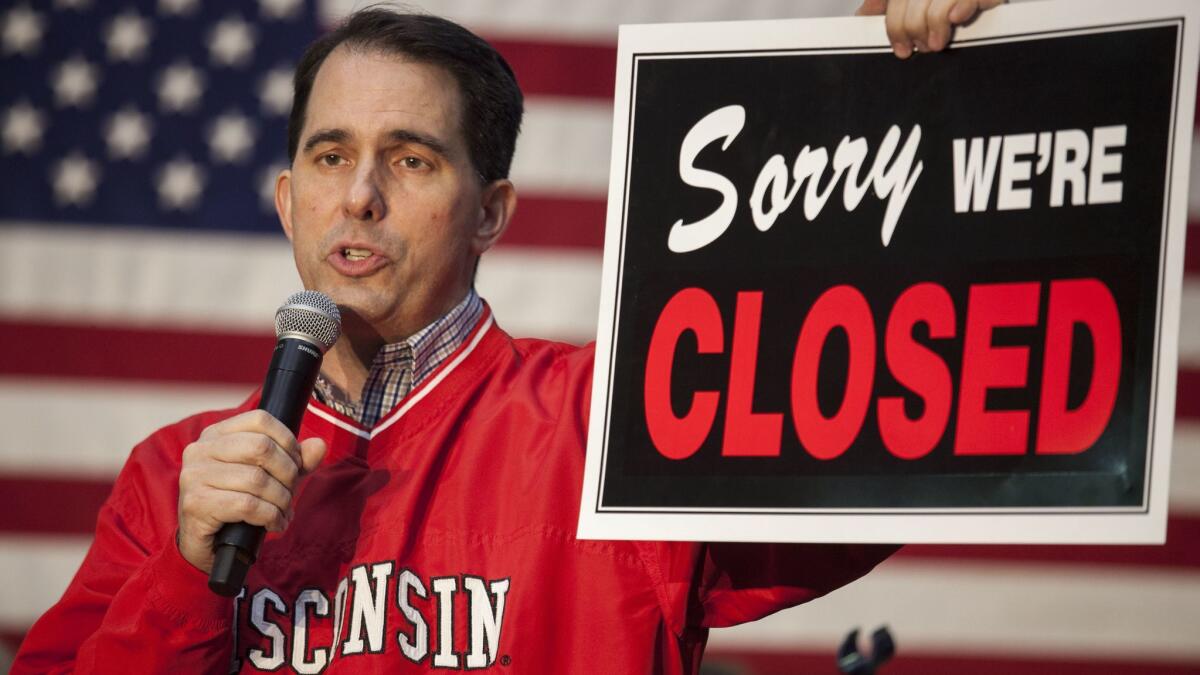Wisconsin voters oust longtime Gov. Scott Walker

Three years ago, Scott Walker entered the Republican presidential primary race riding high, with big-money backers and a legitimate place among the front-runners. That campaign ended after just a few months as Donald Trump bulldozed through the field, leaving Walker and the other contenders in his wake.
For the record:
5:45 p.m. Nov. 7, 2018An earlier version of this article incorrectly described the law governing recounts. The law allows a candidate to request a recount if the vote is within a percentage point of the rival’s. The recount is not automatic.
On Tuesday, the Wisconsin governor’s once rising star flickered out, losing a bid for reelection to a third four-year term to Tony Evers, a genial but spotlight-shy state schools superintendent who fit squarely into what one voter called the “vanilla cardboard” candidate model that Democrats have tended to put up against Walker. One difference: Evers had name recognition and pedigree, having been elected three times statewide to the schools job.
Walker’s national ambitions came back to haunt him with Evers repeatedly hammering him for staking out far-right positions on healthcare and education, as well as his austerity measures on such basics as road construction. Walker’s tightfisted approach, Evers said, had more to do with satisfying his ultra-conservative national Republican donor base than the people of Wisconsin.
The razor-thin race swayed back and forth into early Wednesday, when the counting of about 47,000 absentee ballots from deep-blue Milwaukee clinched the race for Evers, with a margin of just more than 1 percentage point.
Walker’s camp had initially considered the possibility of seeking a recount — a position made tougher by a law Walker himself had championed. After a successful demand for a recount of 2016 Wisconsin presidential election results — when Donald Trump carried the state by 22,000 votes, the first Republican since Ronald Reagan to do so — Walker pushed for legislation that allows a candidate to request a recount only if the vote total is within 1 percentage point of his or her opponent.
On Wednesday afternoon, Walker issued a concession statement.
In beating Walker, Evers prevailed over a candidate who’d developed an aura of invincibility in the state. Evers was joined in victory by a slate of statewide Democratic candidates including Sen. Tammy Baldwin, who cruised to reelection, after eight years where Republicans have occupied every top state office except the one Evers has held.
The Democratic resurgence comes in advance of crucial 2020 redistricting, where legislative maps will be redrawn. Democrats have sued over the maps Walker and Republicans drew in 2010, accusing the state GOP of gerrymandering.
Walker not only won gubernatorial elections in 2010 and 2014, but also held off a recall effort in 2012 that came in response to the governor’s early effort to curtail collective bargaining rights for the state’s public-sector workers. That fight against unions and their backers attracted massive Capitol protests and elevated Walker’s status as a rising national conservative star.
Democrats finally whipped their nemesis with a strong get-out-the-vote operation. Statewide, more than 2.6 million people voted, the highest turnout for a midterm election in memory. Evers ran up the numbers in the state’s two largest population centers, Milwaukee County and Dane County, home to Madison, the state’s capital and home of the flagship University of Wisconsin campus.
Voters generally reported being happy with the state of the economy both in the state, where the unemployment rate hovers just below 3%, and nationally under Trump. But independents, who broke for Walker in his previous races, tended to vote against him this time.
“It’s a relief for me personally,” said Jim Doyle, a 56-year-old arts administrator who shares a name with the Democratic governor Walker replaced. Doyle said he wanted to send a message against Trump, who has made nice with Walker since the 2016 presidential primaries.
“The last two years have been nothing short of toxic for me,” he said.
But Doyle also felt repelled by Walker’s record on education. Beyond his union-busting efforts, which resulted in lower pay and benefits for teachers, Walker also cut funding significantly in his first term for both K-12 education and for the state’s 26-campus university system.
“I don’t understand how that’s a positive message for the future,” he said, stating further that Walker and his Republican allies seemed to regard education “as a form of elitism, which frightens me.” Walker never finished college.
Simmons is a special correspondent.
More to Read
Start your day right
Sign up for Essential California for news, features and recommendations from the L.A. Times and beyond in your inbox six days a week.
You may occasionally receive promotional content from the Los Angeles Times.






